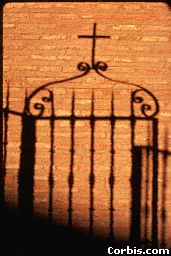| Hell |
| I had an interesting discussion today with Andrew, one of the fellows here at the Mises Institute. We were talking about all kinds of fun God, sin, obedience, Hell stuff.
Anyway, amidst the conversation, he posed me with a hypothetical situation: If God told me to kill him (Andrew), should I? (Technically, he asked "would", so I pointed out the flaw in that... In that I don't always do what I should. Then we changed the question.) I informed him that yes, indeed, I should. Assuming of course that it was actually God telling me. And I have it on pretty good authority that God wouldn't tell me to do that, as Christians are commanded (note: COMMANDED) to make every effort to live in peace with all men (Heb. 12:14). Anyway, the answer that I thought I should kill him threw him off a bit... Apparently, I'm the first Christian that has told him that obedience to God, even when it's not fun and doesn't seem to make sense, is something we should do... But, that wasn't the main point. The main point was about Hell. See, his argument is that God is coercive in sending us to Heaven or Hell because we never agreed to it. I informed him that I believe Hell is eternal separation from God, and therefore is not best seen as "punishment", but rather is best seen as a fulfillment of the desire of the damned. In short, the damned have rejected God, and now God fulfills that desire, and removes His presence from them. That simple. Of course, it does run the risk of downplaying the punishment aspect... But, I'm not sure how "up"played that aspect is in Scripture. Now, it's clear that the eternity of the damned is not comfortable. After all, since all good and comfort flows from God, an eternity without Him would have to be horrible. For an illustration, let's turn to the most vivid depiction of this in Scripture... Revelation 20:11-15 "Then I saw a great white throne and him who was seated on it. Earth and sky fled from his presence, and there was no place for them. And I saw the dead, great and small, standing before the throne, and books were opened. Another book was opened, which is the book of life. The dead were judged according to what they had done as recorded in the books. The sea gave up the dead that were in it, and death and Hades gave up the dead that were in them, and each person was judged according to what he had done. Then death and Hades were thrown into the lake of fire. The lake of fire is the second death. If anyone's name was not found written in the book of life, he was thrown into the lake of fire." You know what's interesting here? The fact that people aren't thrown into the lake of fire based on the judgement from the other books. They're thrown in if their name isn't in the book of life. Now, here we can look back through Scripture and find what is referred to by "book". Most specifically that stands out is the Book of the Covenant (or the book of the law) in the Old Testament. This book was confirmed by the people of Israel in Ch. 24 of Exodus. Then, after the Golden Calf incident in Ch. 32, Moses asks God to remove him from the book! God informed Moses that it was the sinner that would be blotted out of the book. (Note: only Israelites were ever IN the book in the first place.) Another book that appears in the old testament is the book of the chronicles of kings. These give an account of the events that occur. Finally, the book of life. This book appears relatively little in Scripture. It appears once in the old testament (Psa. 69:28). It appears a few times in the new. (Mostly in Revelation) As far as I can tell, the book of life is the book of eternal life. Those that are saved by a relationship with God, established by faith in Him. Ultimately, then being cast into the lake of fire ISN'T the result of what is in the other books (or so it seems), rather, it's a matter of separating those that have embraced God from those who have rejected Him. And each of these desires is fulfilled. For the believers, eternity with Him. For the unbelievers, eternity without Him. |
| Home Philosophy Theology Economics and Finance Politics The Arts Costa Rica 2004 Fun Stuff Links My Blog E-mail Me |
 |